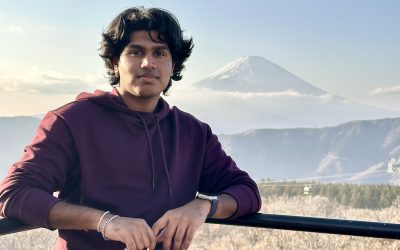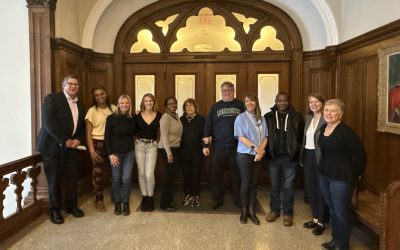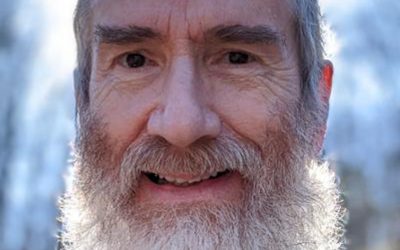Progress and partnerships were celebrated over the three-day event
April 2023 – Drew Theological School hosted “The Healing is in the Tree: Genealogy, Knowledge, and the Making of Healthy People,” a hybrid event celebrating the three-year anniversary of Drew’s Religion and Global Health Forum and partner organization Sikhona Inc.
The three-day event was presented in collaboration with Drew’s Religion & Global Health Forum, Sikhona Inc, and the Theological School’s student-led Women’s Ministerial Alliance (WoMA).
Surrounding the theme of “Holistic Wellness: Body, Mind, and Spirit,” the first day featured several expert guest speakers including Don Sinkfield, owner of Help to Adjust, Inc.; Shanda Gadsden, owner of Heavenly Hands Wellness Spa; and Sundiata Ameh-El, owner of Compost Community.
Eulynis Matthias-Fridie, founder and co-president of WoMA, moderated the day’s event.
After Dean Edwin David Aponte provided opening remarks, Kenneth Ngwa, director of the Religion and Global Health Forum and professor of Hebrew Bible at the Theological School, and Vanessa Wilson T’18,’20, lead pastor of The Church of the Good Shepherd and President of Sikona Inc, reflected on the progress and partnerships made during the three years. “We have all been talking about the social determinants of health, which are geographic, economic, and cultural,” said Kenneth Ngwa. “But what is missing is religion. Spirituality is equally a social determinant.”
Sinkfield talked about the importance of a balanced life by including spiritual, emotional, physical, and mental components during his presentation “Mental Wellness: Don’t Struggle in Silence.”
“There is no conflict between faith and mental health treatment, your walk of faith can be strengthened by cognitive therapy, which helps you to understand your own thoughts, their origin, and motivation,” he said.
Serious mental illness rose among Black Americans between 2008 and 2018 despite rates being less than the overall U.S. population, while major depressive episodes increased from nine to 10.3 percent in Black Americans.
He shared sobering statistics surrounding Black Americans seeking mental health care treatment: 72.6 percent of people chose not to seek treatment, and 42.2 percent dropped out of treatment because they wanted to handle their problems outside of professional care.
“People feel like they are stronger, that they handle it themselves,” said Sinkfield. “But we know that the idea of the village is so important, that we have a bunch of people around us that support us. The Bible is replete with sayings about seeking wise counsel.”
Gadsden presented “Pregnancy Wellness: Hear Her Voice.” According to the National Library of Medicine and the CDC, Black women are 22 percent more likely to die from heart disease, 71 percent more likely to die from cervical cancer, and are three-to-four times more likely to die during childbirth than white women. “This is not a new crisis,” she said. “The disparity stems from racism and social economics, systematic racism stands from the history of enslaved people,” said Gadsden.
Agriculturalist, farmer, and composter, Ameh-El presented “The Garden: What the Father Prescribed. “We’re rediscovering ourselves as human beings and our relationship with the planet,” he said. “When the Bible mentions the earth, all it mentions is the earth,” he said, referring to the vital importance of healthy soil for plants and livestock.
The second day of the event was an online “Stay-at-Home Tea Time,” a practice instituted by Wilson for her congregation to “gather and take a respite from the busy day.”
Wilson provided an overview of the history and work that the Church of the Good Shepherd and Sikona Inc provides to the community.
Wilfred Ngwa, director of Global Health Catalyst, addressed the theme “Your Cup Overflows: Healthy and Medicinal Plants,” by providing an introduction to phytomedicines, or plant medicines.
An estimated 80 percent of the world’s population uses some variety of phytomedicine.
For example, justicia, a plant found in tropical climates, contains higher levels of hemoglobin than humans and is used by many African countries to control high blood pressure and anemia. Wilfred Ngwa explored further potential uses of justicia, including a future safe blood substitute.
Medical cannabis also holds promising potential in pain management and treating certain cancers.
The third day of the event celebrated the launch of the multi-institutional C-4 health initiative partnership. C-4 is a wholistic, spirituality-infused, non-proselytizing approach to community health. With churches functioning as “Health Hubs,” the C-4 initiative leverages reliable use of technology and the commitments of medical and science researchers and church leaders to bring health to the community, rather than wait for sick persons to come to hospitals.
The event closed with Kenneth Ngwa preaching a Thanksgiving service at the Church of the Good Shepherd.



